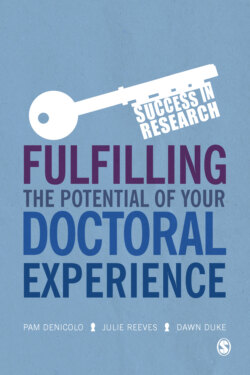Читать книгу Fulfilling the Potential of Your Doctoral Experience - Pam Denicolo - Страница 17
На сайте Литреса книга снята с продажи.
Implications of the contemporary doctorate for newer researchers
ОглавлениеFor many new doctoral researchers, it is not simply the level of work required that comes as a surprise but also its nature. If we are to guide you to get the most from this degree, then we must start by being realistic and honest. When we meet new researchers for the first time we often ask for their understandings about the doctorate and are often concerned by descriptions such as the following:
‘It is like a master’s but much bigger;’ ‘It is called a doctor of philosophy but that is a historical name; not much philosophy now in doctorates;’ ‘My supervisor will tell me what to do and when, and I will get on with my bit of the big research project;’ ‘You have to write a thesis in complex language using multi-syllabic words to show your erudition!’ ‘It will involve loads of reading until my supervisor tells me to stop.’
Comments like those above indicate the need to consider what researching for a doctorate entails. There is, indeed, a large step-change between a master’s degree and a doctorate, and, of course, a greater one if the transition is from an undergraduate degree. However, every doctorate involves some philosophical consideration of about the nature of knowledge and what are appropriate paradigms and ways of accessing it, while considering the ethics of the process. Further, one of the key skills that researchers should learn is to make the complex accessible and the specialist topic understandable to lay people. However, there are also other challenging features to contend with, such as:
the increasing amount of independence required throughout the process;
the continuing lack of certainty about the nature of the outcome;
whether the research questions are relevant, sensible and unique;
and whether the chosen research activities will answer them.
Indeed, prolonged uncertainty is a key feature of doctoral study, with many commentators suggesting that tolerance of uncertainty (finding it stimulating rather than dispiriting), along with stamina/perseverance and passion, are key attributes of good researchers. Angela Duckworth and colleagues (2007) incorporate these into their key attribute for long-term success: grit. They suggest that achievement of difficult goals (a doctorate must surely fit this description) entails not only talent but the sustained and focused application of that talent over time.
In the Denicolo and Reeves book (2014), although we had not then come across Duckworth’s work, we compared levels of study with feats of swimming, likening undergraduate study to gaining awards in national competition and master’s study to winning Olympic medals. In those cases, though huge effort is needed – and talent and stamina – the end of the race is visible; the lanes are clearly marked in a clean, clear and calm pool; your competitors are in view beside you in the water and supporters are close by, with cheers and warm towels at the ready. In contrast, the requirements of doctorate level study are more comparable to swimming the English Channel: the other shore is shrouded in mist; there are no lanes and many nasty or dangerous things are floating or sailing or swimming around you; you have little idea what the competition is up to; and you are alone in the choppy water albeit that your supervisor may be shouting encouragement and guidance from a dingy in the vicinity. Your personal supporters have little idea about what you are engaged in and keep asking if you are nearly finished yet! Although we cannot teach you to have grit in such circumstances we can nevertheless provide you with strategies to overcome some of the obstacles to success, or at least find your own way around them, building your confidence with each mini-success in the process.
You will find that a key feature of many of our recommendations in this book is careful planning. The first important plan relates to choosing the right kind of doctorate to meet your needs. If you have already made that choice, depending on the stage you have reached, then you may find it useful to go on to the next chapter, about making a good start, or Chapter 3 about developing your role as a researcher, or Chapter 5, which delves more deeply into making the best use of resources and opportunities that abound in higher education. If you have yet to make the decision about what kind of doctorate and mode of study would suit you, then the next section may be of help.
